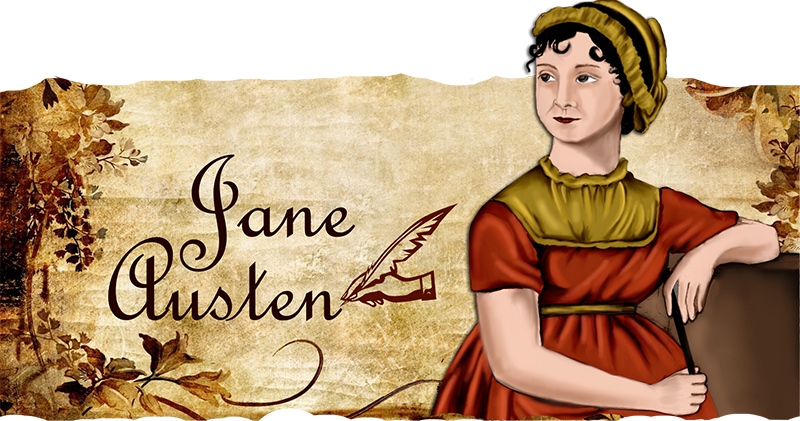
There's no better way to visualise the challenges and the opportunities presented before the previous generations than to enjoy the life-stories, penned by doyens of literature like Jane Austen, whose work transcends the boundaries of time and culture. The realistic dialogues of the endearing characters, the moral dilemmas they endured, their hypocrisies and manipulations, the compromise between true love and financial security, and their struggle towards emancipation, makes her novels touch the hearts of readers across the social hierarchy. The haves and the have-nots, the young and the old, men and women are equally mesmerized by the magic of her imagination. Among the notable works of Jane Austen, are the timeless classics like "Sense and Sensibility" and "Pride and Prejudice", while many others are enjoyed even two centuries after her untimely death. The objective of this biography is to delve upon the life-story of Jane Austen with a view to analyse the circumstantial and destined events that made up her so called "uneventful" existence.....

In a quaint little parsonage in the village of Steventon, Hampshire in the UK, the Reverend George Austen who was the parish rector, busied himself with his fatherly duties. His wife of eleven years, the thirty six year old Casssandra Leigh Austen was expecting their seventh child in the December 1775, when Christmas was round the corner. The only measure of birth-control was the practise of having separate bedrooms and this wasn’t adopted by the couple whose family expanded rapidly with seven children being born within the span of a decade. To care for this large family, Rev. Austen now required to supplement his income, so he took to tutoring pupils at home, cultivated the farm, in addition to conducting his parish duties of baptism, burials and the Sunday service.
A beautiful daughter with a round face and bright dark eyes was born on the 16th of December 1775, much to the delight of her parents and her three year old sister Cassandra, who shared her name with their mother. She was christened as Jane and basked in the security of her mother’s bosom while being mainly breast-fed for around fourteen weeks. However, the intimacy was short lived as Jane’s mother stopped weaning her when she was three months old, and handed her over to the one of the village ladies at Steventon, who reared her until she was eighteen months. The practise of child-rearing was customary, and was a practice followed with all the siblings who managed to grow sturdily, with the exception of George, who was around ten years older than Jane but continued to live in his foster home, on account of suffering from epileptic fits. Jane’s mother whose hands were full with managing the busy household, supervising the washing, and arranging for the meals of the students, milking the parsonage cows, handling the kitchen garden and the poultry, had no qualms about the physical separation with her suckling daughter, as she felt that all babies merely require to be fed and warmed in hygienic conditions.

When Jane was brought back to her home, she found herself surrounded by boys, including her four brothers James, Edward, Henry, Francis and the students who resided with them. Her father’s pupils spent time learning Latin and Grammar. They used the microscope to discover the patterns in amoeba and wondered over the marvels of nature. They had access to his well-stocked library which comprised timeless classics, and even used the globe to understand Geography. The number of pupils at Steventon was in such large numbers so as to be able to run a school. The close interaction helped forge lifelong friendships with the students. Jane’s mother participated in the events at the school, and got even busier when her youngest son Charles was born in 1779.This meant that there was no opportunity to strengthen the bond of love and affection between Jane and her mother. The absence of any quality interaction meant that the motherly touch was provided by her elder sister Cassandra, who became Jane’s eternal companion and confidant.

The environment at Steventon was conducive to cognitive and artistic development. The family bonded over poetry reading sessions, and enacted plays scripted by the children themselves under the patronage of their eldest son James. He was the official “writer”, as he had a flair for writing prose and verse, which he inherited from his mother.
In the summer of 1779, the family was visited by Sir Thomas Knight who was accompanied by his newly wedded wife Catherine. The Knights were related to the Austens and were landlords of the Steventon Estate. The couple were enamoured by the charm of twelve year old Edward, and offered to take him for a holiday. The attachment grew sufficiently enough for them to legally adopt Edward as their own son after a few years. The move was resented by Mr. Austen, who was persuaded by his wife to grant his consent, in view of the large fortune that would be inherited by their “lucky” son.

Jane was now six and was attracted by the fearlessness of her brother, Francis, who was just a year older than her. He even managed to buy his own pony, which he rode on hunting sprees with great élan! Spending her childhood in a boys’ school, meant that Jane was familiar with riding, hunting, cricket and the cheerful quarrels between boys, who were at the threshold of manhood. At the age of eight, Jane was sent to a boarding school along with her sister Cassandra and cousin Jane Cooper. Though she squirmed at the thought of the deportment due to the strict disciplinarian regime at a boarding school, the prospect of being separated from Cassandra was even more daunting. The lure of Cassandra’s companionship was enough for her to accept this exile from home once for the second time. The fact, that the cost of their education would be less than the fee paid by the additional students who would be accommodated in their room, seemed to make her parents happy. Jane disliked the drudgery of school and withdrew into an impenetrable shell. However, every cloud has a silver lining, and in Jane’s story, her disillusionment with formal education meant that she spent hours being enchanted by the wonderful world of books. She later contracted an infectious illness and her critical condition made her alarmed mother rush to her side, to nurse her back to health. When the girls were withdrawn from school, Jane read voraciously and devoured the books in her father’s library.

The girls were soon packed off for a second stint at another boarding school in Reading, run by a Mrs. La Tournelle, and spent an uneventful year, with basic knowledge being dished out to the girls. They were summoned home in 1786, and this marked the end of their formal education.

Around this time, Eliza Hancock, their French speaking cousin who had married Capot de Feuillide, came to spend Christmas at Steventon, along with her mother, aunt Philadelphia. Cousin Eliza was radiant at twenty-five and played the piano every day while enjoying the flirtatious jokes of Henry who was fifteen. Eliza brought a book by the French children’s writer Arnaud Berquin, as a birthday present for Jane. The family put up two plays by the renowned dramatist Mrs. Cowley; this coupled with merry dancing sessions, meant that Eliza spent a delightful Christmas at Steventon in 1787.
Henry also joined his older brother James at St. John’s College, Oxford. The family was now better off financially. Francis completed his studies at naval school while Jane played the piano and spun imaginative stories for her family which had by now begun to acknowledge her talents. Jane was extremely affectionate towards all her brothers and wrote regularly to Frank, who in turn sent detailed accounts of the trials and tribulations in the adventurous life of a naval officer. Her stories were rich in perfect imagery and depict a clear understanding of human life, largely on account of the precise communication by way of letters exchanged between the siblings. Around this time, in January 1789, her eldest brother James, published his own weekly magazine called the ‘Loiterer’, which was circulated in London, Birmingham, Bath and Reading for over fourteen months. It was successful in attracting subscribers and consisted of essays and short stories which reflected the ethos of the young generation.

Jane’s literary talent was encouraged by her loving father, who generously provided for the expensive paper and stationery required, by the budding authoress.
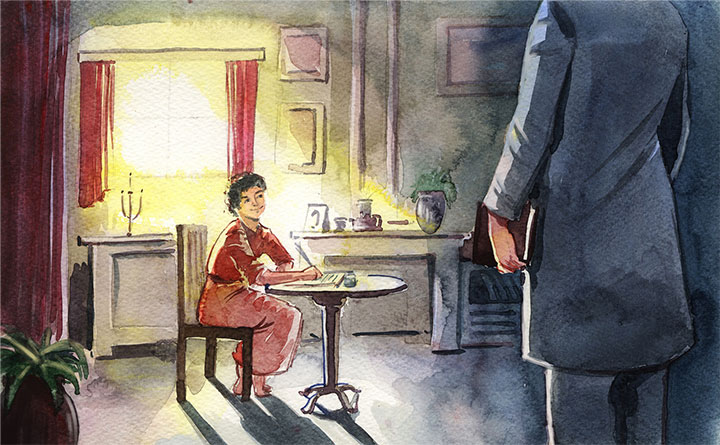
Beaming with pride, as a loving gesture, her father wrote a graceful tribute on the first page of her new notebook, ”Effusions of fancy by a very young lady consisting of tales in a style entirely new.” He guided her choice of books, as her first resource was his library at Steventon. Jane was an avid admirer of renowned authors like Samuel Richardson and Dr. Johnson, whose works gave her an insight into the complexities of human nature. Woman novelists like Charlotte Lennox, Maria Edgeworth and Hannah Cowley, also made an impression on the young lady. Jane drew inspiration from the works of Shakespeare, and it is because of this exposure to literary maestros that Jane grew into a versatile writer. Her works “Lesley Castle” and “History of England” were transcribed into three books. Jane’s characters, reflected the hypocrisy and obsessions of women who sought to call themselves liberated, even though the quest for financial empowerment, bound them in the shackles of loveless matrimonial bonds. Aunt Philadelphia personified the class of penniless women driven to marry men twice their age, who sought physical intimacy and gratification, in exchange for financial security and lifelong maintenance. The theme of a woman’s status in the social fabric, her vulnerability, her compromise as she subjugates herself into domesticity without any romantic inclinations, merely for economic freedom, was encapsulated in the body of her notable works. Her brilliant portrayal of bold young women, who were human enough to go astray, yield to temptations, and courageously bear the consequences, captivated the hearts of her readers. In the summer of 1790, Jane dedicated her book, ”Love and Friendship” to her favourite cousin Eliza, who was close to her heart. Eliza was then going through trying circumstances and in the year 1791, her mother suffered from breast cancer and eventually succumbed to it, after a painful year-long struggle. Her five year old son Hastings, failed to attain the normal milestones of development, and it was apparent that he would not be able to lead a normal life. The French revolution was at its peak, and Eliza continued to stay in London. James Austen the eldest of the siblings was the first to marry. He married Anne Mathew, the daughter of a General.

Jane, now “sweet sixteen” was expected to make the transition into womanhood as love was in the air and so was the pressure to attract a suitable husband. Jane socialized with her neighbours, the Biggs sisters, Martha and Mary Lloyd, who often accompanied her on shopping excursions and ballroom dances. These interactions gave her a glimpse of life’s realities which were then woven into her stories to give them their endearing texture.
Her brother Edward who was heir to the Knight’s estate, got married to Elizabeth Bridget, a baronet’s daughter. This marked the beginning of a new phase of life for Jane and Cassandra, who enjoyed being doting aunts for their eleven nieces and nephews who lived at the Knight’s family home - the luxurious mansion Godmersham. Edward was gracious enough to share his riches with his siblings, and organized family reunions at his Godmersham villa. His wife Elizabeth, shared a jovial relationship with her sisters-in law, though she was particularly fond of Cassandra, who often pitched in to help her during periods of confinement. The stark contrast between the flamboyance of Godmersham and the humble lifestyle at the Steventon rectory was made apparent in the condescension of Edward’s elitist associates towards his rather ordinarily groomed sisters. Jane, who was an infrequent visitor to her brother’s home, was always perceived with this humiliating discrimination. It was this sensitivity towards the vibes generated by specific situations, that made her execute the story of “Catherine” with great finesse. This was her first novel, which she penned at the impressionable age of sixteen. The story, captures the prudence with which penniless women travel to distant shores, to ensure sustenance, by marrying wealthy men who are twice their age. It is a heart-rending representation of the prevalent realities of that time.
Meanwhile, Edward’s daughter Fanny and James’ daughter Anna, were born in 1793. Henry gave up plans of being a clergy-man, and joined an army regiment in Southampton, as the war between England and France gathered strength. Charles, her youngest brother followed the footsteps of Francis and joined the Portsmouth Naval School at the age of twelve. On the 22nd of February 1794, Eliza’s husband was guillotined and this brought an end to her long-distance marriage of over twelve years, where individual aspirations took primacy over familial bonding, and she found herself impoverished as her wealth got drained in a land reclamation project, mistakenly instituted by her late husband.

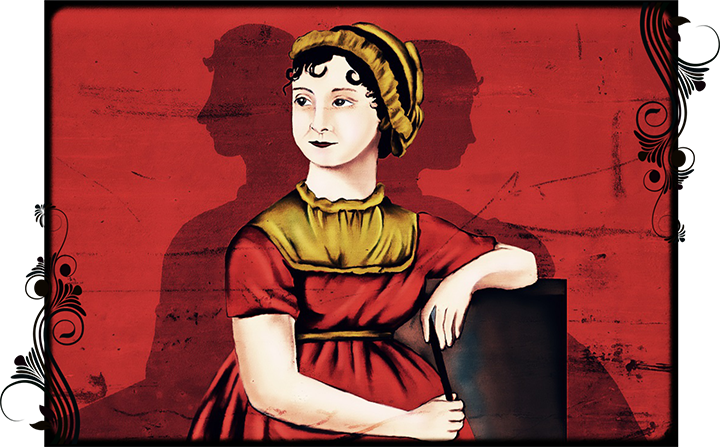
Jane was now eighteen and incorporated the socially approved nuances of womanhood including manipulative relationships, clandestine adultery, contractual marriages, stifled passions and power-play in her short novel named “Lady Susan”. The Austen family, on account of their privileged status as clergymen, mingled with the entire spectrum of the social hierarchy, ranging from the “nouveau riche” pseudo-gentry, to the snobbish royalty, and this gave Jane the opportunity to witness the entire gamut of human behaviour and relationships. Jane was highly interested in the intimate relationships and family histories of her colourful acquaintances, as their anecdotes enlivened her books. Though she delighted in dancing at ball-room events, they are mocked at as spouse-hunting arenas in her books. The new year of 1794, cast a shadow of despair at Hampshire as Eliza’s widowhood was followed by the inexplicable death of Anne, the wife of James Austen in May 1794. The untimely demise bewildered the family and two year old Anna was brought to her grand-parent’s home and lived in the foster care of her aunts. Cassandra was engaged to Tom Fowle in the same year and in view of the paucity of funds to arrange their marriage, he agreed to the prospect of earning a substantial income by sailing into the West Indies as the head of a military regiment which fought the French. Jane who was young and vivacious at twenty spent the year 1795 immortalizing Elinor and Marianne who were the leading ladies of her new novel, which was the basic version of the much acclaimed “Sense and Sensibility”.

Jane Austen grew to be an unconventional beauty, but was not vain of her hazel eyes, sanguine cheeks or brown hair which curled down her face. She opted for simplistic hair-do’s which were preferred over the elitist powdered hair-styles sported by her wealthy sister-in-law Elizabeth. Around Christmas in 1795, she was smitten by a handsome Irish lawyer who was visiting his Uncle and Aunt Lefroy at the Ashe rectory at Steventon. Jane could not help being enticed by this charming young man who was at the start of his career, and had no inheritance to boast about. Jane had the audacity to make her vulnerability known to everyone who attended the ball, in spite of the knowledge that their financial situations nullified the probability of an engagement and hopes of a future together. In one of her letters to her sister Cassandra, she reveals her boldness by acknowledging having discussed the subject of Fielding’s Tom Jones, which centred around sexual attraction and adultery, with the irresistible Tom Lefroy. However, Tom Lefroy was promptly whisked away from Steventon by his worldly-wise aunt, and never met Jane again. Her love-story exemplified the contemporary societal norms where love has to be sacrificed at the altar of family reputation and economic considerations.

The new year of 1796 brought with it an end to the admission of pupils into Steventon, due to which Jane and the women-folk were relieved of their housekeeping chores. The heart-break of unfulfilled love reflected itself in her writings, which reverberated with an array of human emotions. Jane, who was ever mindful of the fact that paper was expensive, wrote legibly with minimal cancellations. She kept the tradition of reading her work aloud to her family, and elicited much appreciation from her father. The proud father approached a publisher named Thomas Cadell in November 1797. Mr.Austen also enquired of the expense involved in publishing her first novel titled “First Impressions”, at the author’s expense which implied that he had utmost faith in the future success of his daughter as a brilliant authoress. However, it marked the beginning of a long struggle, and Mr. Cadell declined to accept the manuscript. This was the very first draft of “Pride and Prejudice” which went on to bring eternal fame to its writer.

Life went on as usual, with Jane leaning upon her soul-mate Cassandra, on whom she relied on for advice and approval, even for the most trivial matters. One of the remarkable traits of Jane was, that her literary acumen did not make her egoistic or conceited, and she performed the seemingly ordinary tasks like sewing, cleaning etc. with equal enthusiasm. In fact, she often questioned the prejudices which assigned the tasks of sewing, cooking to women, while hunting, gaming, accountancy and business were necessarily male bastions. Charity towards the less fortunate families that resided at Steventon village was always of prime importance to her. The summer of 1797 brought the tragic news of the death of Tom Fowle, Cassandra’s fiancée and this enveloped the entire family in dark clouds of grief. However, Cassandra who had the maturity to deal with the irreplaceable loss, did not display any hysterical outbursts, but resorted to domestic chores which offered solace. She maintained her propriety and embraced widowhood, blinding herself to the romantic overtures of prospective bachelors who were charmed by this elegant beauty. Tom Fowle had been prudent enough to nominate Cassandra as his rightful heir before he set sail and she received his widow’s portion of 1000 pounds. This incident pushed Cassandra into an early spinsterhood and she vehemently refused to give love a second chance. This is in contrast to James who married Mary Lloyd and Henry who tied the knot with Cousin Eliza thus, starting the second innings of their lives.

Jane, on her part, seemed to make men feel acutely inadequate on account of her wit and intelligence. Her reluctance to be fashionably presented at all times, is indicative of her indifference towards attracting the opposite sex by feminine graces. She was exposed to the lives of the elite strata of society on account to her visits to the luxurious villa of Edward in Kent, where life was a flamboyant celebration exuding extravagance. In 1798, she began writing “Susan”, later known as “Northanger Abbey”, which is a fictitious account of horrendous happenings at an abbey lorded over by a cruel master. An amazing characteristic of her work was that the dialogues were cleverly crafted with a touch of ingenuity, such that they emanated a lifelike exchange of ideas, encompassing feelings of love, jealousy, anger, possessiveness etc. She completed the book in the span of a year, which was another feather in her cap. A barely twenty four year old woman, completing three novels over a period of four years is indeed a commendable achievement!

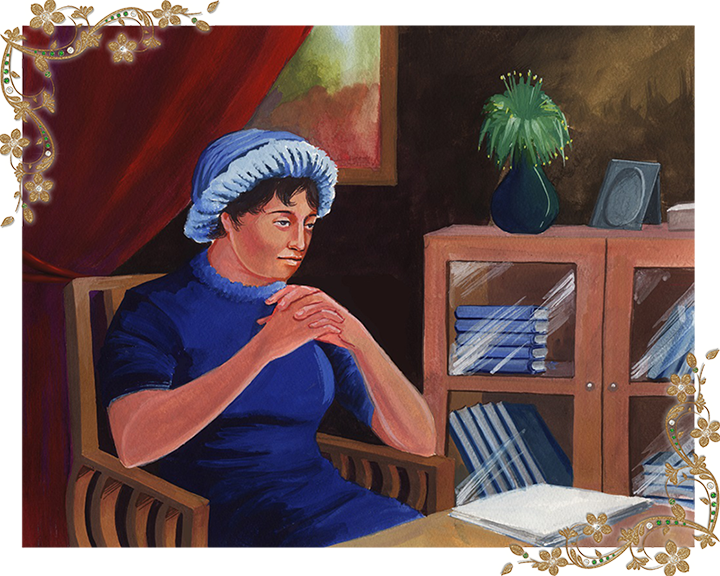
In December 1800, just after her twenty-fifth birthday she received a jolt from the blue when Reverend George Austen and his wife made an incredulous decision to shift from Steventon to the resort town Bath, without any consultation with his daughters. The Austen sisters who grew in the bliss of a countryside haven, were baffled at this decision which brought with it their uprooting from the portals of a cherished childhood home. The move to Bath meant a severing of the ties that were nurtured over two decades, and tugged at the core of their hearts. Her brother James was to take up residence at the Steventon rectory after relinquishing his duties at the Deane parsonage. The arrangement, which was apparently perfect, left Jane distraught. Her mind pulsed with turmoil at what seemed to be an infringement upon the family’s treasured artefacts, furniture and the contents of her father’s library. The sale of her cherished piano cast a spell of gloom over the sisters, who had a special affinity to Steventon. The other siblings expressed their ire over the irrecoverable loss of a home filled with childhood memories, and made it a point of visiting their parent’s home while their father was the master.
Their mother chose Bath, as it was a holiday destination, besides the added advantage of proximity to her rich brother, Leigh-Perrot, who resided there. Jane was irked not only by the urbanised environment of Bath, but also due its status of being the ideal husband–hunting ground. The abandonment of the Steventon home was as grim as her banishment, first as an infant, and later as a seven year old student. Jane was pushed into the throes of depression, and she internalized her anguish into the innermost recesses of her heart. It is this trait that’s responsible for her withdrawal into a shell, with an outwardly stoic demeanour, signifying a general feeling of mistrust. Jane was certainly averse to being thrust into the life of a constant traveller, as the family toured to various towns and cities over the next four years. The most poignant impact of the change was, Jane had lost her ability for creative written expression.
For over ten years, the pen which created marvellous stories seemed to freeze! Time flew in the frequent retreats planned by her parents, as they experienced the hospitability of various inns. Jane gradually settled into domesticity, albeit half-heartedly. Her mother fell seriously ill in the spring of 1802, but escaped from the clutches of death on account of the selfless love and focussed devotion from her husband and daughters.

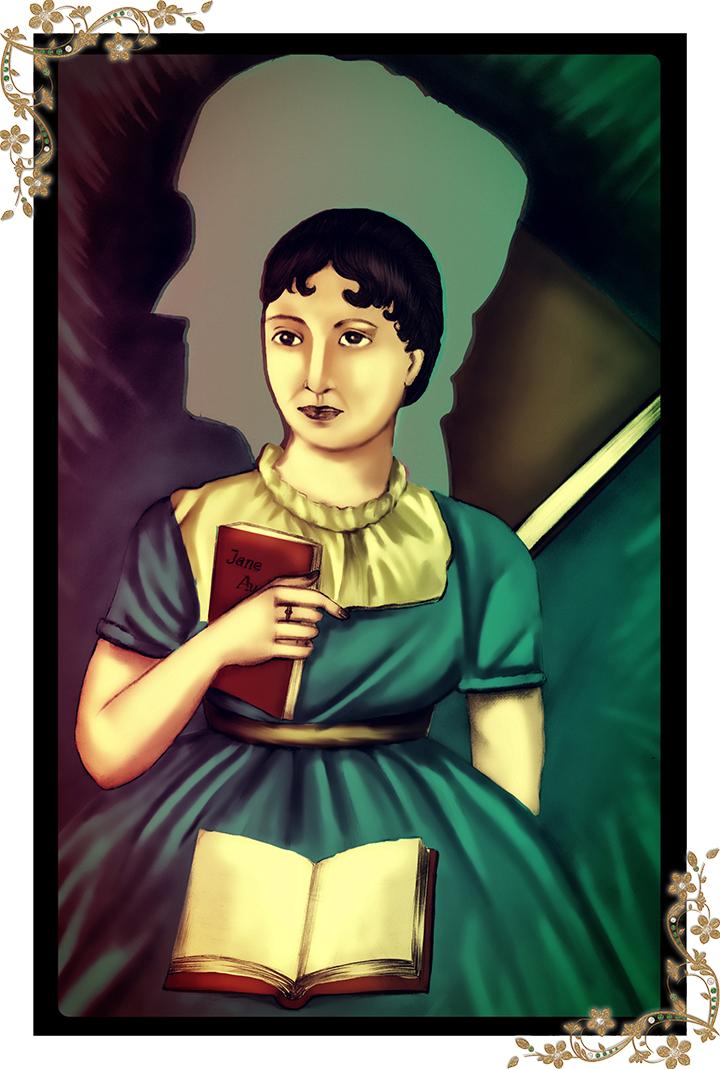
In the winter of 1802, Jane and Cassandra went to “Manydown”, the home of their childhood friends the Bigg sisters. Their pleasant stay revived many happy childhood memories of plays, shopping, and ball-room dancing. In an unexpected twist to a fabulous vacation, Harris Bigg, their brother and heir to the large estates, proposed marriage to Jane. She seemed to be in a daze, and instantaneously accepted the proposal thereby consenting to the engagement. The family was elated, as Harris was an ideal husband whose fortuitous circumstances and estates would ensure lifelong financial security for Jane and her parents. Jane’s mind was riddled with confusion and she spent a restless night pondering upon her impulsive decision. She was dead against the prospect of making marriage a business like contract, where financial empowerment scored over love and romance as the deciding factor. The unpretentious Jane was true to herself and in a candid conversation with Harris admitted her mistake. Somehow, she garnered the courage to follow her heart and broke the engagement the very next morning. The delightful holiday met with an abrupt end. For Jane it signified a final closure of all hopes of experiencing the joys of a blissful marital union.

In December 1804, the family suffered from a major setback as Mr. George Austen passed away on account of a brief illness, and each of his children felt the loss of a loving father. Death was accepted nonchalantly by the family, who surrendered to the will of the almighty, and carried on with the business of living without brooding over the loss. In fact, Jane could not help pondering upon the dignified peaceful expression which characterized her father’s corpse, as he escaped into the unknown realms of a heavenly kingdom. Jane devoted herself to being an ideal daughter, a loving sister and an affectionate aunt. She accompanied her bereaved mother for family reunions at the homes of their various relatives. She spent almost ten years of her life, cautiously carrying her manuscripts with her, making sure they aren’t misplaced in the various wagons, carriages and motels, while the family was in a state of perpetual transit. Jane was meticulous enough to safeguard her precious bundles from ruin on account of fire or water.

Jane’s brother Edward and his wife Elizabeth, often invited the family to Godmersham. Jane was almost thirty now and enjoyed watching her nieces and nephews growing up so fast. It was here, that a lifelong friendship based on mutual admiration was forged with the governess Anne Sharp, who critically reviewed all her books on account of her intelligence. She remained one of Jane’s closest friends even after she gave up her job and answered each query with an honest opinion, as they rallied together throughout life’s ups and downs. In October 1808, the thirty-five year old Elizabeth, who was Edward’s well-bred and well looked after wife passed away suddenly, just a week after the birth of her eleventh child. The constant pregnancies and the afflictions of confinement that young wives were burdened with were a source of constant dismay to Jane. The loss of precious lives, as these young women bore children haplessly until they were pushed into the arms of death, made Jane question why women had no control over family planning, which was such a crucial aspect of their lives. Jane however left no stone unturned to comfort her nephews as they dealt with their mother’s death by organizing boat rides, origami, treasure-hunts and other boyish activities to keep them entertained. Edward who owned a large estate was finally persuaded to allow his mother and sisters the privilege of residing in a permanent home. He offered to organize their stay at Chawton cottage in rural Hampshire after it was vacated by his tenant. This development marked the end of their decade long nomadic existence and the beginning of a heartily yearned stability in the life of Jane.

The trio shifted base to Chawton Cottage, and her friend Martha Lloyd joined them as she was a solitary spinster and her parents were no more. The insecurities of single women and their propensity to remain poor was one of the reasons Catherine Bigg, a mutual friend preferred marrying a sixty year old man who was twice her age over the perils of spinsterhood. Jane was penniless and perceptive of her bleak future, but began to realise that being single carried with it the blessings of freedom and liberty. In 1810, Richard Crosby, a London publisher, was approached by Henry who now took over as her literary agent. Crosby purchased the manuscript “Susan” which we now know as “Northanger Abbey” for a measly amount of 10 pounds but made no effort to publish it. Jane mulled over the buyback of her script, but failed to garner the 10 pounds required to re-purchase it, as she was dependent on the charity of others for her minimal expenses.
The magical effect of having a permanent home with a delightful garden where one felt serene in the lap of nature was seen in her literary prowess. She resumed her writing with great enthusiasm and spent hours in her study as the family members took over most of the burden of domestic chores. Jane and Cassandra continued to share a bedroom, where they discussed her work at great length. Cassandra loved her without measure, and the intensity of her emotions can be gauged by the loving statement, “She was the sun of my life, the gilder of every pleasure, the soother of every sorrow”. Jane worked discreetly away from prying eyes, in the segregated office section, where a creaking door served to warn her against the arrival of a stranger, following which she covered her sheet with a piece of blotting paper. In 1811, Henry and Eliza coughed up the money required to finally publish her first book after requesting Thomas Egerton of the Military Library, Whitehall for his assistance. Though he declined to invest his own money, he published the book on a commission basis. Finally, after proof-reading sessions at Eliza’s residence, “Sense and Sensibility” was published anonymously. By the summer of 1813, the book was phenomenally successful and Jane made a profit of 140 pounds.
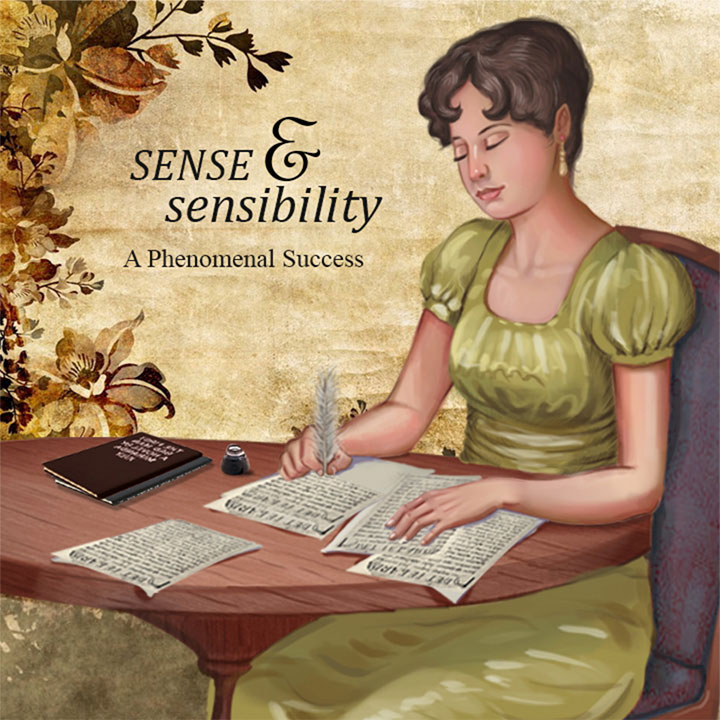
This was her first rightfully earned income, and she was ecstatic. This signified her first leap towards financial freedom, and meant that she could plan to enjoy the simple pleasures of life without seeking the charity of another. The caterpillar had finally emerged from the cocoon and soared towards economic independence. The book was admired across the social hierarchy, and appreciated for the authentic portrayal of human nature. Literary circles bustled with encouraging reviews though the authoress revelled in her privacy. The overwhelming response led Egerton to advance 110 pounds, for the copyright of her forthcoming novel, ”Pride and Prejudice”.
Meanwhile, Jane’s authorship was gradually made public, mostly by her brothers who could not help boasting about the fact that the intriguing authoress was none other than their humble sister. The moral values of society were undergoing a radical change. The Prince of Wales was finally appointed as Prince Regent in 1811, as the King was afflicted with dementia. The general public which deified Royals, now began to question the propriety of ostentatious lifestyles and scandalous liaisons. Jane’s forthcoming book “Mansfield Park” was a description of the social hierarchy in Britain. It dealt with passion, intrigue, hypocrisy and power play. Jane staunchly criticised the degradation of moral standards, and the indifference towards religious norms and the sanctity of marriage displayed by royal families. Jane travelled to London ever so often, in order to oversee the formalities required for book-publishing. In London she spent a few days with her favourite cousin, Eliza, who always graciously supported her, in turning her dream to be a successful authoress into a reality. Unfortunately, Eliza passed away on 25th of April 1813, after valiantly struggling in a painful battle with breast cancer, following the footsteps of her late mother. Jane’s book, “Mansfield Park”, was a controversial book which got a mixed response from the public, when it was published a year later. Many dignitaries and renowned authors expressed their desire to interact with the talented writer.

The summer of 1813, saw Jane suffering from persistent pain in her face, yet she ignored it, and put all of her energy into giving the final touches to Mansfield Park. Jane, like many of her contemporaries, carefully preserved fan mail and letters that conveyed the public’s reaction to her work. It was one of the happiest phases of her life where she basked in the kindness of her brothers. She was affectionate towards her nieces and nephews, who displayed a flair for writing plays and verse, and guided them gently as their thoughts germinated into creative words. Aunt Jane as she was fondly known, took her brother’s kids for plays and dramatic performances as they were now teenagers who inherited a passion for the arts. Bubbling over with wit and humour, she often referred to Cassandra and herself as “we the formidables”.
The particularly harsh winter of 1814, with outdoor excursions impossible on account of the freezing cold, served to restrict her indoors, and she poured her energy into the completion of “Emma”. It was an intensely gripping novel which was completed in barely fourteen months. The spring of 1815, was the time for a well-deserved rejuvenation and recreation, so she spent time in London enjoying the Shakespearean plays. John Murray, the founder of the prestigious magazine “Quarterly Review” agreed to publish “Emma” on commission basis. During this period Henry fell ill and the siblings rallied around him, to ensure his recovery. The close-knit family that stood united when any of the members was in distress was the backbone for the success, enjoyed by each individual. While Jane was nursing Henry, his physician who recognised the author of “Sense and Sensibility”, informed the Prince Regent that she was in London. The Prince was an admirer and immediately deputed his librarian Mr. Clarke to call upon Jane, conveying his patronage and that she might dedicate her new novel “Emma” to his royal Highness. Emma was published in December 1815 and the authoress who was a champion of protocol, accepted royal desire as royal command. The profit earned on account of Emma was almost nullified on account of the loss incurred in publishing a second edition of Mansfield Park.
The year 1816 brought bad tidings for the entire family. Charles, her youngest brother was struggling to bring up his motherless daughters, the younger of whom was diagnosed with water in the brain. Jane was empathetic towards the torturous suffering which stirred the very core of her being. Henry was declared bankrupt on account of a complete collapse of his banking business. James, Edward and Frank who had invested their savings in Henry’s defunct bank, bore the brunt of the downfall. Adding to their woes was the fact, that Edward was in the midst of a legal battle to preserve the ownership of his estates and James, their eldest brother was facing deteriorating health, which drained his stamina. Mrs. Austen and her daughters who were managing their expenses, partly with monetary contributions from these men, also felt the financial strain which was coupled with emotional pain. Jane was gradually sapped of her strength and vitality, but she chose to be oblivious of her failing health and engrossed herself in penning down her latest novel, ”Persuasion”. After almost six years of selling the manuscript to Crosby, she garnered the 10 pounds required to pay him for the buyback of her manuscript of “Susan” which was eventually published as “Northanger Abbey”. Cassandra who expressed concern for her illness, suggested that they spend time in retreat at the spa town of Cheltenham, which was renowned for its ‘healing water’. In July 1816, she finally completed “Persuasion” in spite of several distractions, while graciously hosting family members as house guests at her Chawton home. Upon perusal of the script, she found the last two chapters distasteful and in a heroic effort she rewrote them entirely in just three weeks! After a six-month lull, she forwarded the manuscript for publishing in April 1817.
The once pleasurable walks now became a daunting prospect for Jane, who felt incapacitated due to ill health. She preferred to rest on a ‘sofa’ which was basically constructed by propping pillows on three adjoining chairs. This gesture reflects her deep regard for her mother, Mrs. Austen, who would not recline on the existing sofa and prefer to leave it empty for Jane if she knew it ensured the comfort of her daughter. Impeccable values and deep compassion were her chief personality traits. ‘Sanditon’ was her last novel which she abandoned after jotting down twelve chapters in a last-ditch effort to fight with intermittent fever. She had a premonition of not being able to recover, and this prompted her to write a will on the 27th of April. The alarmed family finally shifted her to Winchester for treatment, which was their last resort by the end of May. The physician Mr. Lyford candidly informed the family, that her condition was critical. Cassandra left to no stone unturned to ensure her recovery, but her effort was futile. Jane bore great pain and constantly counted her blessings. She was filled with gratitude, mainly on account of having a family which remained committed to her well-being till the very end. She surrendered completely to God’s will and gracefully wished for death, as it would mean a release from the excruciating pain which she had patiently borne. Jane, finally breathed her last with her head resting on the lap of her loving sister, on the 18th of July, 1817.She was buried in the magnificent Cathedral at Winchester on the 24th of July, which was arranged by Henry who had joined the clergy.
Her will made Cassandra her executrix and left her everything. A legacy of fifty pounds, was set aside for her brother Henry who was closest to her heart for his efforts to get her work published. A special legacy of fifty pounds for Madame Bigeon, who was her Cousin Eliza’s selfless caretaker, depicted her benevolence and her deep respect for the under-privileged helpers, whose heroic contribution in our lives is usually overlooked.
Northanger Abbey and Persuasion were published in 1817, almost five months after her death and Cassandra received a profit of five hundred pounds. Life went on for the family, albeit without the mirth of Jane who made the Austen clan worth remembering. The docile little girl who took refuge in the world of books to find her imagination soaring, became immortal, even though she gave the world just six books!
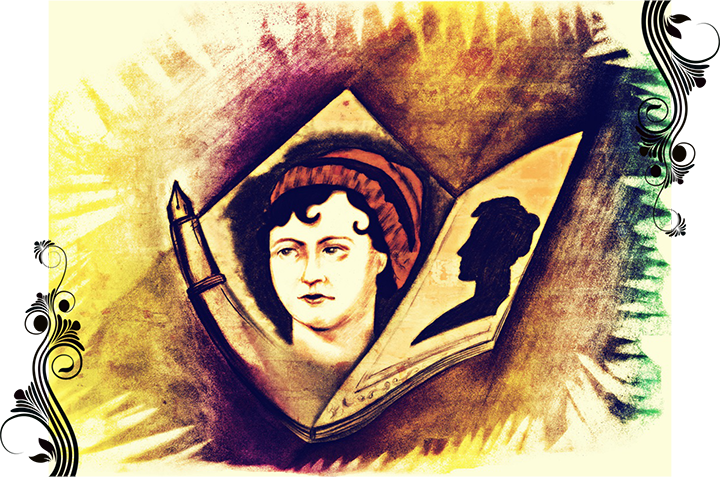
It makes us wonder about the immense potential of this blessed authoress whose tryst with life was cut short when she was on the verge of attaining her crowning glory. Millions of fans have written tens of thousands of articles, in an endeavour to understand the complexities which made Jane Austen an enigma. Her books have been made into award-winning films and television series.
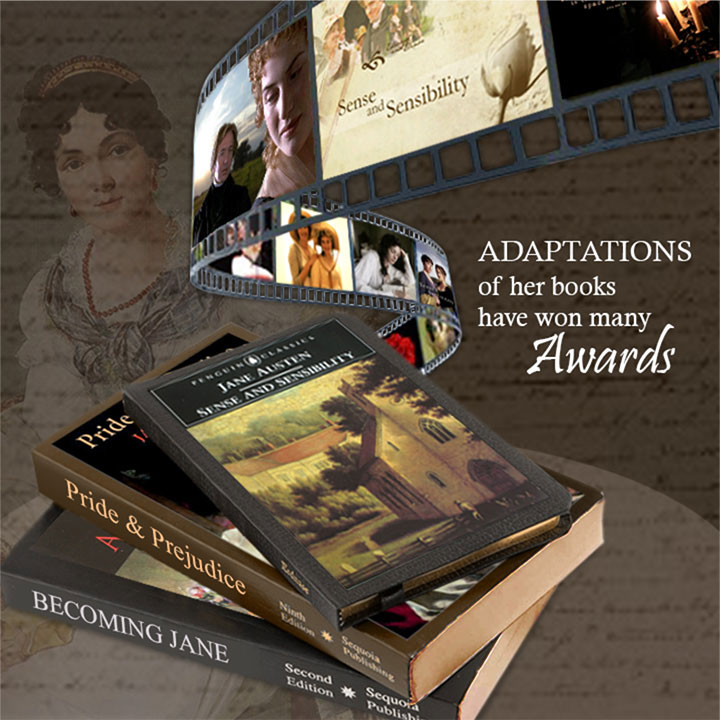
The famed publisher Richard Bentley negotiated with Henry Austen for the copyrights of all her works in 1832 which was after a twelve year gap, since Murray published the last collection. Jane Austen’s classics have never been out of print since then! The world pays a fond tribute to the woman of substance, a woman who believed in her dreams, a woman who scaled the temptation of a comfortable wealthy existence, and had courage enough to resist a loveless marriage, a woman who cared for the less fortunate and who lived for her family. Jane’s life inspires us to add life to our years in contrast with our focus to add years to life…
Biography of Jane Austen | 0 Comments >>
0 --Comments
Leave Comment.
Your email address will not be published. Required fields are marked.

